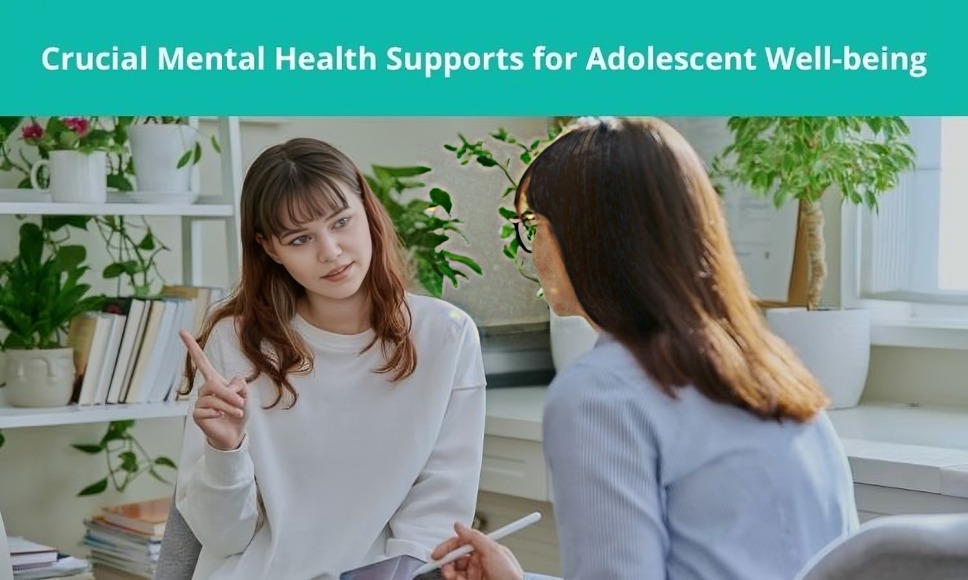Adolescence is a developmental phase of life that is full of growth, self-realization, and challenges. The passage from childhood to adulthood involves emotional, social, and academic demands that at times become overwhelming. As more and more teenagers have developmental issues, it is essential to equip them with the appropriate support systems that help develop resilience, confidence, and overall wellness.
In this blog, we will discuss the importance of adolescent mental health, the typical issues they encounter, and the most important support systems that can assist them in navigating this vulnerable stage of life.
Understanding Adolescent Mental Health
Adolescence is a time of accelerated brain development, particularly in regions involved in decision-making, emotional control, and social relationships. These alterations, coupled with hormonal changes and environmental pressures, may render adolescents more susceptible to Adolescent mental health issues.
One in seven adolescents suffers from a mental disorder, the most prevalent being anxiety and depression, according to the World Health Organization (WHO). Most mental illnesses develop during adolescence, and if not addressed, they can carry over into adulthood, influencing academic achievement, relationships, and life satisfaction.
Common Mental Health Issues Among Adolescents
1. Anxiety and Stress
- Academic stress, peer pressure, and fear of the future may contribute to chronic anxiety and stress.
- Social fear and fear of judgment can affect self-esteem and engagement in social events.
2. Depression
- Sadness, hopelessness, or withdrawal from friends and family members may signal depression.
- Outside factors such as bullying, domestic issues, or traumatic events can also lead to depressive episodes.
3. Low Self-Esteem and Identity Issues
- Teenagers tend to grapple with self-image, body image, and self-esteem as a result of societal pressures and social media influence.
- The search for identity and belonging may create insecurity or self-doubt
4. Substance Abuse and Risk-Taking Behavior
- Adolescents use alcohol, drugs, or risk-taking behavior as a coping mechanism for stress or peer pressure.
- If left to themselves, the tendency becomes addictive and has long-term health implications.
5. Eating Disorders
- Conditions like anorexia, bulimia, and binge eating usually result from negative body image and social pressures.
- Social media and diet culture play a huge role in developing disordered eating habits.
6. Self-injury and Suicidal Ideation
- A few teens use self-injury as a method of coping with emotional distress.
- Suicide continues to be one of the highest mortality rates for adolescents, a reason why there is an acute need for mental health intervention.
It is critical that in the light of such issues, there must be solid mental health support systems so that teenagers get the help and advice they require.
Key Mental Health Supports for Teen Well-Being
1. Parental and Family Support
Family has a primary function in forming adolescent mental well-being. Parents can ensure their adolescents feel safe and appreciated through a caring and understanding home environment.
- Creating Open Communication: Adolescents require a place where they are allowed to express their thoughts and feelings without judgment. Parents should listen and acknowledge their feelings.
- Noticing Warning Signs: Being attuned to changes in behavior, mood swings, or withdrawal allows parents to step in early.
- Fostering Healthy Habits: Good sleep, nutrition, and exercise can enhance Adolescent mental health.
- Lessening Stigma: Educating parents on mental health allows for the usual discussion and normalization of seeking assistance when necessary.
2. School-Based Mental Health Programs
Schools have an important role in the early identification and intervention of Adolescent mental health problems. Positive school climates can contribute a lot to the well-being of adolescents.
- Counseling Services: Schools need trained counselors to offer individual guidance to students facing stress, anxiety, or academic stress.
- Mental Health Education: Incorporating mental health issues in the curriculum helps students identify and deal with emotions effectively.
- Peer Support Groups: Trained student-led support groups can offer a secure environment for adolescents to discuss their challenges and get advice.
- Bullying Prevention Programs: Prevention of bullying and cyberbullying through awareness programs and strict policies can minimize anxiety and depression in students.
3. Professional Mental Health Support
For teenagers with acute Adolescent mental health issues, expert care from therapists, psychologists, or psychiatrists is required.
- Cognitive Behavioral Therapy (CBT): This tried-and-tested method assists teenagers in reframing harmful thoughts and adopting coping strategies.
- Medication (if required): In certain instances, medication from a professional may be helpful for treating conditions such as anxiety and depression.
- Family Therapy: Family and sibling sessions can be useful in enhancing family relationships and strengthening support systems.
4. Peer and Community Support
Teenagers usually seek support from their peers. Building healthy peer networks and community support systems can contribute much to Adolescent mental health.
- Youth Support Groups: Neighborhood organizations can provide mentorship and support through structured support programs.
- Online Communities: Mental health forums and apps are able to offer a feeling of belonging and shared experiences.
- Volunteering and Social Engagement: Involving adolescents in community service can help establish a sense of purpose and belonging.
5. Healthy Coping Mechanisms and Self-Care
Educating adolescents in healthy stress management can stop Adolescent mental health issues from intensifying.
- Mindfulness and Meditation: Teenagers can remain centered and control anxiety by practicing mindfulness skills.
- Physical Activity: Physical exercise releases endorphins that enhance mood and alleviate stress. Sports, dance, or yoga can be rewarding ways to release emotions.
- Creative Expression: Activities such as doodling, journaling, music, or art therapy can be beneficial in allowing adolescents to channel emotions positively.
- Digital Detox: Reducing social media use can limit comparison-induced stress and enhance self-esteem.
6. Safe and Inclusive Digital Spaces
As much time as some teens spend on the internet, there is a need to design safe online spaces to ensure mental wellness.
- Mental Health Apps: Platforms such as Headspace, Calm, and Woebot provide guided meditation, therapy guidance, and stress management features.
- Healthy Social Media Content: Subscribing to pages that advocate for self-love, inspiration, and mental wellness awareness can be inspiring.
- Online Safety Education: Educating teens about online boundaries, digital health, and not exposing themselves to damaging content is necessary.
Breaking the Stigma: The Need for Open Conversations
Despite the growing awareness of mental health issues, stigma remains a barrier to seeking help. Encouraging open discussions in families, schools, and communities can create a culture where mental health is prioritized just like physical health.
- Encourage Help-Seeking Behavior: Remind adolescents that reaching out for support is a sign of strength, not weakness.
- Normalize Therapy: Success stories of therapy or counseling can help break fear and myths.
- Educate Through Media: Utilizing movies, books, and social media campaigns can make awareness about Adolescent mental health more relatable.
Conclusion
Adolescence is a critical period for the development of Adolescent mental health. By offering supportive environments, teaching teens coping skills, and decreasing stigma, we can assist them in overcoming challenges and flourishing. Whether through family support, school initiatives, professional services, peer relationships, or self-care activities, all efforts contribute to adolescents' overall well-being.
Investing in teenage mental health today is investing in a healthier, more resilient generation for the future.
How Solh Wellness Can Help:
At Solh Wellness, we provide holistic, compassionate support to individuals who are experiencing emotional turmoil. Through our tech-driven platform, we offer anonymous counseling, support groups, and mental health resources to individuals experiencing distress, particularly those facing abusive family dynamics or relational struggles. We offer evidence-based interventions that help individuals navigate emotional crises while fostering resilience and hope. By creating awareness about mental health and making help-seeking behavior the norm, Solh Wellness seeks to break the cycle of isolation and provide the support needed to prevent further tragedy.
R.E.A.C.H. is the pinnacle of your mental health and BUILD;
Resilience: Solh's personalized plans help users build emotional strength and coping strategies, fostering long-term resilience and emotional well-being.
Evaluate: Streffie stress tracking helps users evaluate their stress at three levels—actual, perceived, and measured—empowering proactive management before a crisis emerges.
Act: Crisis management tools are immediately accessible, and the user can reach out to mental health professionals using Talk Now.
Connect: Support groups make users feel like they belong. They can relate to others going through similar problems, which makes them less isolated and helps them find healthier ways of coping.
Heal: Anonymous counseling and educational resources guide users to recognize their emotions, work through difficult situations such as abusive relationships, and start healing in a safe environment.
Together, we can address the roots of suffering, providing much-needed mental rest and clarity. Reach out to Solh Wellness today for professional help if you, or someone you know, needs it.



